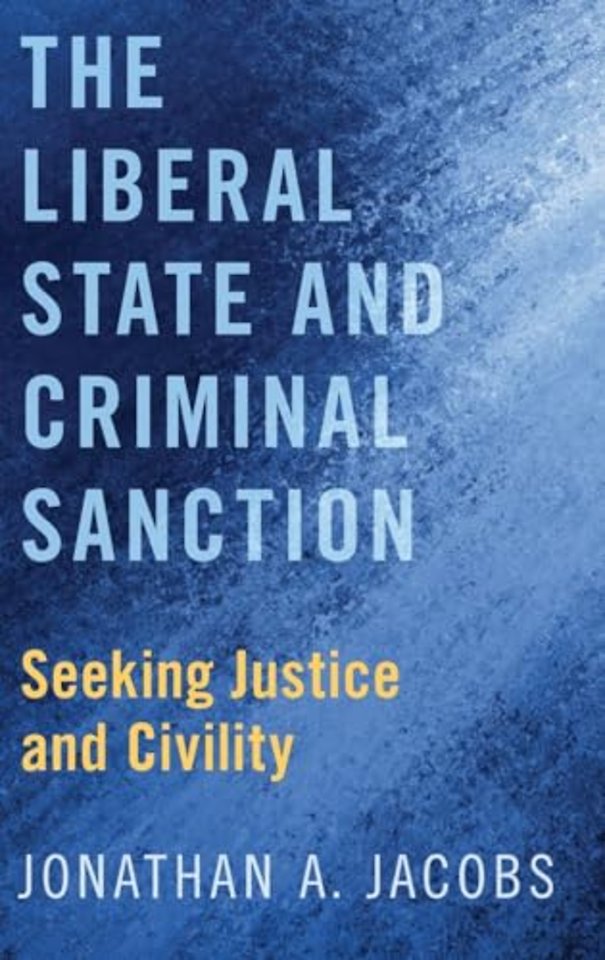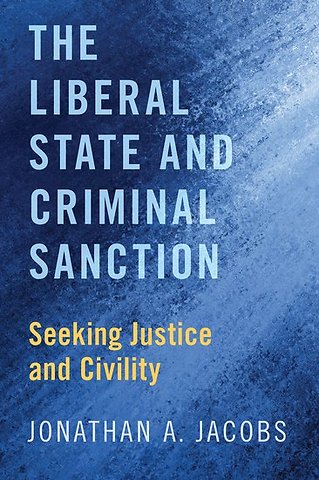



Jonathan Jacobs is Professor and Chair of Philosophy at John Jay College of Criminal Justice, and a member of the Doctoral Faculties of Philosophy and Criminal Justice at the Graduate Center of the City University of New York.
Meer over Jonathan JacobsThe Liberal State and Criminal Sanction
Seeking Justice and Civility
Samenvatting
In a liberal democracy, theory suggests that the political order and character of a civil society are closely connected: the political order allows for a dynamic and pluralistic civil society, and people's civic participation encourages support for the political order.
In examining the role of punishment in the U.S. and the U.K., however, Jonathan Jacobs maintains that the current state of incarceration is antithetical to the principles of a liberal democracy and betrays an abandonment of that project's essential values. The existing system imposes harsh injustices on incarcerated people: it subjects them to inhumane prison conditions, creates numerous obstacles that block their reentry into society upon release, and erodes their capacity to participate in civic life and exercise individual moral agency. And in recent decades, the number of its people that the U.S. has incarcerated has grown dramatically.
Jacobs engages with substantial philosophical literature to argue that necessary and significant reforms to the U.S. and U.K. criminal justice systems demand a serious recommitment to the values and principles of a liberal democracy. Topics include the justification and aims of punishment, the role of criminal justice within theories of a just society, and empirical considerations regarding long-term incarceration and its impact.
By comprehensively exploring the relationship between criminal justice and justice, he highlights distinctive elements of criminal justice as the basis for a retributivist conception of punishment that highlights desert and proportionality. Jacobs defends retributivism against familiar accusations that it approves vindictiveness and inevitably harms offenders, and shows how consequentialist approaches are seriously flawed. Drawing equally from both philosophy and criminology, Jacobs argues for a renewed dedication to the values and principles of a liberal democracy as critical to the possibility of criminal justice being truly just.
Specificaties
Inhoudsopgave
Introduction
Chapter 1: The Political Order
1.1 The Liberal Polity
1.2 Civil Society
1.3 Civil Society and Moral Education
1.4 The Rule of Law and Morality
1.5 Liberalism and Civility
Chapter 2: Criminal Justice and Justice Overall Part I
2.1 Equality and Egalitarianism
2.2 Contexts, Liberty, and Egalitarianism
2.3 Criminal Justice, Distributive Justice, and the Liberal State
2.4 Criminal Justice, Distributive Justice, and Civility
Chapter 3: Criminal Justice and Justice Overall Part II
3.1 Some Contextual Factors
3.2 To Which Values Should Criminal Justice Respond?
3.3 The Dispute Over Desert
3.4 Desert and Agency
Chapter 4: Retributivism and Resentment
4.1 Reasons to Reclaim Retributivism
4.2 Concerns about Consequentialism
4.3 A Role for Resentment
4.4 What is Being Communicated by Criminal Conviction?
Chapter 5: Deficits of Justice and Civility
5.1 The Harm Being Done
5.2 Some Important Aspects of Prison Culture
Chapter 6: Retributive Sanction
6.1 Some Misconceptions about Retributivism
6.2 Distinguishing Diverse Retributivist Approaches
6.3 Communication and Proportionality
6.4 Better Outcomes Without Consequentialism
Conclusion
Anderen die dit boek kochten, kochten ook
Net verschenen
Rubrieken
- aanbestedingsrecht
- aansprakelijkheids- en verzekeringsrecht
- accountancy
- algemeen juridisch
- arbeidsrecht
- bank- en effectenrecht
- bestuursrecht
- bouwrecht
- burgerlijk recht en procesrecht
- europees-internationaal recht
- fiscaal recht
- gezondheidsrecht
- insolventierecht
- intellectuele eigendom en ict-recht
- management
- mens en maatschappij
- milieu- en omgevingsrecht
- notarieel recht
- ondernemingsrecht
- pensioenrecht
- personen- en familierecht
- sociale zekerheidsrecht
- staatsrecht
- strafrecht en criminologie
- vastgoed- en huurrecht
- vreemdelingenrecht





